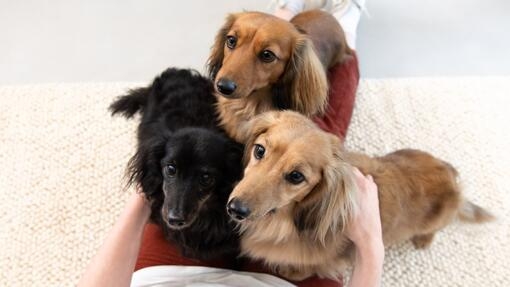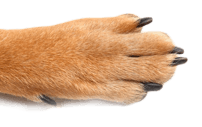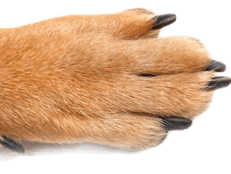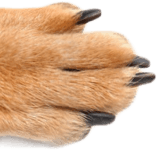Small Dogs for Families with Kids: The Best Breeds for Your Home
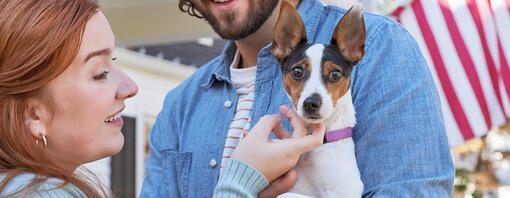
When welcoming a small dog into a family with children, it's important to do some research to find the perfect breed and to be realistic about how much time and energy you will have to spend on a canine companion. . We'll explore some of the best small dog breeds that fit well into family life.
However, it’s not just about finding a dog that’s good with children. You have to make sure your children know how to behave around dogs – and look on them as living, breathing, sentient animals that need to be handled gently and with respect – not as toys.
This also means always keeping an eye on them together, never leaving children alone with any dog, and teaching them when they can interact and play with the dog and when their pup needs quiet time and to be left alone.
Keep reading to find our top picks for some small dog breeds that are perfect family companions.
Why Small Dogs Make Great Family Pets
While most of the breeds we think of as being child-friendly are larger breeds such as Labradors and Golden Retrievers, some of the small dog breeds can make a fantastic addition to your family if you don’t have the space – or the time for hours of exercise. However, just because a breed is small doesn't mean they're child friendly or will fit into a busy home.
Some small dog breeds get overwhelmed or over-stimulated by noise and movement, which isn't great with children running around. Others are very much one-person dogs with little interest in anyone else, which isn’t good if everyone wants to spend time with their new doggy friend.
Some of the small breeds are just too delicate and not robust enough for family life and can be easily injured – especially as puppies.
Thankfully there are plenty of small breeds that will fit into a busy household with children and make great companions for all the family.
Just because they are small however doesn’t mean that they won’t take up time and energy. All dogs no matter their size will need exercise, grooming, social contact and training. Smaller dogs often take longer to toilet train (as they have much smaller digestive systems) and can be more prone to separation related behaviour problems. Make sure you are prepared for the time and energy this will take up before you get a puppy.
What Small Dog Should You Get?
Now, you might be wondering, 'if not all small dogs are great with kids, which ones are?' Well, that's exactly what we're going to dive into. We're going to look at some of the small dog breeds that tend to be great for families. But remember, while there are ones that appear to be a great choice for your family you still need to consider the dog's personality and their needs, and how that matches yours and your home environment.
Cavalier King Charles Spaniel
Known for their friendly and affectionate nature, playfulness and ease of training, Cavalier King Charles Spaniels make great dogs for children – especially older ones who want to train a dog themselves or even take part in some of the dog sports. With their feathery coats, they do need grooming a couple of times a week and de-tangling after every walk. While they have long been known as almost the perfect small dog for families with children, the big downside here is that there are serious health issues in the breed so finding a breeder who prioritises health, does all the available health tests (talk to the breed club for details) and breeds healthy lines, is vitally important to avoid huge vet bills and heartache.
Miniature Poodles
Known for their hypoallergenic coat, the middle size of Poodles (Miniature)can be a fantastic choice for families, with the advantage that they are non-shedding. They bond closely to the whole family, can get on with other animals, and a very affectionate. They are also highly intelligent and clever – making them fun and relatively easy to train – although they do not like being left alone. They are extremely social, and high energy so will need plenty of exercise and games – but are very happy to join in with whatever the family are doing. Being non-shedding and so having an ever-growing coat, means they require professional grooming every six weeks or so – or else you would need to have the time and commitment to learn to do it yourself.
Miniature Schnauzer
The smallest of the Schnauzers, the Miniature Schnauzer is a bright, friendly, clever dog who is easy to train and is happy to join in with any family games or outings. They are constantly alert – and take their duties as an early alarm system seriously – so can be noisy and so not ideal for living in a flat or with close noise-sensitive neighbours. They are playful and active so enjoy long walks and adventures with their family. Their low-shedding coat works well to keep the home hair-free but needs regular professional grooming/stripping/clipping or else enthusiastic owners can learn how to do it themselves.
Border Terrier
One of the more easy-going of the terrier breeds, the Border Terrier is ideal for families with older children who want a ‘go anywhere, do anything’ fun companion who is trainable, affectionate and up for any adventure. They are more of a rural breed than an urban one, being at their happiest exploring the countryside, but with plenty of exercise, games and companionship, can be happy just about anywhere. Fairly low maintenance coat as long as they get twice yearly hand stripping which is best done by a professional.
Staffordshire Bull Terrier
Staffordshire Bull Terriers are ideal for families with older children or teenagers. They're fun, affectionate, active and love pretty much everyone. They are known for their endless patience and love of playing games and patience with children – although they can be too boisterous for smaller kids or those who aren’t confident with dogs.
They have very low maintenance coats so grooming is minimal. While they love people, some Staffies aren’t so good with other dogs – especially if not well socialised which can mean careful management and keeping them on a lead in public.
Papillon
With their butterfly-like ears and endearing, gentle personalities, Papillons can make wonderful family dogs for quieter families. They are affectionate, playful and highly intelligent, and so can be trained to a high level and can even compete in some of the dog sports. Toilet training can take some time in this breed so patience and consistency is needed, and they do not like to be left alone but they are small enough that they can accompany you just about anywhere.
Basset Griffon Vendéen (Petit)
Charming, amusing and affectionate, the Petit Basset Griffon Vendeen makes a great family dog for rural homes who enjoy their happy, adventurous, hound-y nature. While they are robust enough for active family life, love everyone (although not usually safe with small furries), and will join in with any game or adventure with joy, this is a breed who looks on training – especially recall – as a multiple-choice question. Nothing is more important than following a good sniff – and when the nose is on, the ears are very definitely off - so a well fenced garden and constant supervision is a must, as they can easily wander off and get lost!
American Cocker Spaniel
This is a fairly rare spaniel in the UK, known for their cheerful, active, outgoing personalities, as well as their trainability. American Cockers are wonderfully friendly companions and will bond to the whole family. These energetic dogs require plenty of exercise, games and social contact to keep them healthy and happy – and can easily compete in dog ports with older children looking to take their first steps into the competitive world. While maybe not an obvious choice, they are a fantastic addition for an active household that enjoy outdoor adventures – and who enjoy grooming.
Norfolk Terrier
One of the less common terriers, the Norfolk Terrier is known for their remarkably even temperaments, making them wonderfully calm and steady family dogs. Like most terriers, they are better with slightly older children but are affectionate and love their families. Some can be a little reserved with strange people and dogs, so socialisation is important, but they are very attached to their families and make for an enchanting addition to the family.
Tibetan Terrier
Able to bring a playful energy to your family life, Tibetan Terriers are lively active dogs who are enthusiastic about everything they do, although their vocal nature does mean that they’re not the quietest companions. With a high maintenance coat, you’ll have to enjoy grooming even if you choose to keep them clipped shorter. They are smart, energetic dogs who need training and plenty of games and social contact to stay healthy and happy – and can make great agility dogs for older children interested in training and dog sports.
These are only some of the small breeds of dog that you could consider when looking for your new canine companion – but whatever you choose, do your research and spend time with adults of the breed to make sure you – and your family – like them, and are able to give them what they need to be content and fit into your life.
Choosing the Right Small Dog for Your Family
When choosing a small dog for your family, there are a variety of considerations, but the most important one will be choosing a breed that matches your family’s lifestyle.
Matching a Dog’s Personality to Your Family’s Lifestyle
When you are looking for your ideal dog, there is a lot to think about:
- Do you have time for a dog? Even a small dog needs training and takes up daily time and energy.
- What kind of environment do I have – urban or rural?
- The ages of your children and their activity levels.
- How noisy and active is the home?
- How much you can dedicate to daily training, exercise and grooming – and are you ready to do the toilet training, sleep training, socialisation and life skills training while your new dog is settling in?
Some families who think they want a dog, just don’t have the extra time to be able to give a dog when they need but others can make perfect homes as long as they choose wisely.
Tips for Introducing a Small Dog to the Family
Bringing a new dog into your family, regardless of size, is a big step, so it is important to be fully prepared long before your pup comes home. No matter how excited you and your family are, for your puppy, this is a really scary change. They are a baby who is on their own away from their mum and littermates for the first time in their life. It’s important to make their homecoming as smooth and stress free as possible so they start their life as a family dog the right way.
Before you bring a puppy home – or rehome and adult dog – make sure your children know how to behave around a dog. Introducing them to quiet adult dogs belonging to friends or family is a great first step.
Make sure they know all the ground rules – such as:
- Never wake the dog or disturb the dog when they are sleeping or in their bed.
- Leave the dog alone while they are eating -whether that is dinner or a tasty chew treat.
- Always handle the dog gently.
- If the dog walks away or indicates that they don’t want to be touched, don’t chase them or hang on to them.
And for the adults:
- Don’t leave the dog and children alone together.
- Supervise all interactions.
- Interrupt any play that is getting too rough or when you see the dog is getting overwhelmed or over-aroused.
- Involve the children in walks and daily exercise.
Ideally get your puppy from a breeder who has reared the litter with children – so the puppy is already used to the sights, sound, smells and activity of family life.
FAQ
Small dogs can be great with young children, but just like with larger dogs, it's important to monitor their interactions with children and to choose a breed that fits in with your lifestyle.
The amount of exercise that small dogs need varies by breed, but all dogs require daily exercise, plenty of social interaction and enrichment to stay healthy and happy.


